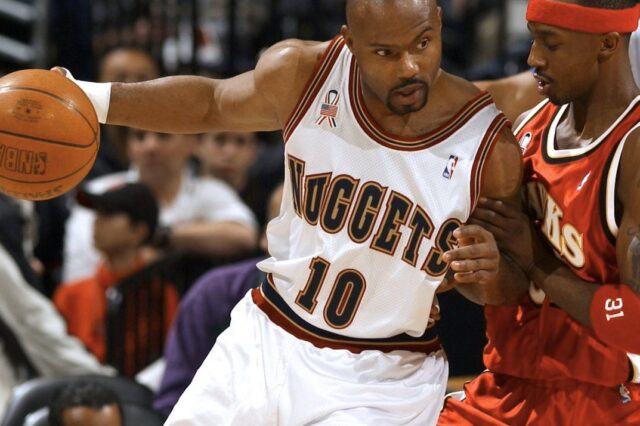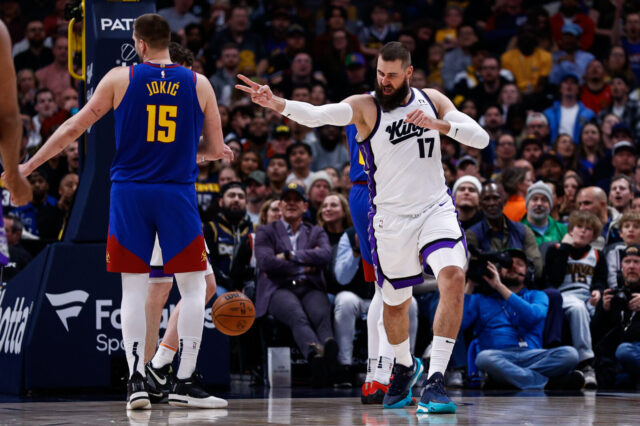Russell Westbrook just posted one of the most impressive seasons in NBA history this year. Putting up 42 triple-doubles, averaging a triple-double over the course of the year, and willing the Oklahoma City Thunder to wins with excellent clutch performances, Westbrook embodied what the MVP award is all about.
And he still won by just 135 points against James Harden, who put up a historic season of his own.
The quality of top talent in the NBA has increased over the last 30 years, as has the overall talent pool. Players are continuing to put up ridiculous numbers in a league that focuses on how individuals affect team performance. In the NBA, where 15 (now 17) players make up a roster, superstars have grown increasingly important. With the recent moves of Kevin Durant teaming up with Stephen Curry and company on the Golden State Warriors and Chris Paul moving to the Houston Rockets to play with Harden, it’s clear that to compete in the NBA, at least one superstar is mandatory.
The Denver Nuggets believe they have a great candidate in Nikola Jokic, and I tend to agree with them. At just 22 years old, Jokic put up a season for the ages. There have been some really effective centers during the 3-point era (since 1979), but only five others have been in the same category as Jokic during their second seasons:
This content is no longer available.
Three Hall of Fame players in David Robinson, Shaquille O’Neal, and Yao Ming, a Defensive Player runner-up in Rudy Gobert, and another generational talent in Karl-Anthony Towns. Adding Jokic to such a list almost feels silly, but he’s earned the right with his play to this point.
At just 22 years old, it’s also silly to project where Jokic may end up during the next ten years, but for the heck of it, let’s see how other comparable big men performed during their next few seasons. Instead of just comparing Jokic to the five players above though, I want to put together a five-year progression of ten comparable big men. This list is based on win shares, age, minutes, and a degree of play style.
- Al Horford
- Tim Duncan
- Yao Ming
- Jonas Valanciunas
- Vlade Divac
- Kevin Garnett
- Pau Gasol
- Chris Bosh
- Chris Webber
- Anthony Davis
This content is no longer available.
Gaps in the lines signify injury-shortened or lockout seasons of more than 30 games that negatively affect the win share amount. Jokic is in the bold, baby blue, and he’s sitting pretty in the top half of this chart. The four closest players to Jokic during his second season are Yao, Anthony Davis, Tim Duncan (who actually did miss 32 games in his second season), and Pau Gasol.
So, it’s clear that Jokic has at least put himself into good company. It’s hard to tell if it’s MVP caliber though.
The only two players on this list to win MVP are Duncan and Garnett. Davis may eventually win one if he stays healthy for a full season, but Duncan and Garnett are the true comparisons here. Let’s throw in Dirk Nowitzki too, as he won an MVP during 2006-07, and see what numbers Jokic would have to put up to reach the caliber of those players.
| Player | Season | Minutes | Points | Rebounds | Assists | Win Shares |
|---|---|---|---|---|---|---|
| Tim Duncan | 2001-02 | 3329 | 25.5 | 12.7 | 3.7 | 17.8 |
| Tim Duncan | 2002-03 | 3181 | 23.3 | 12.9 | 3.9 | 16.5 |
| Kevin Garnett | 2003-04 | 3231 | 24.2 | 13.9 | 5.0 | 18.3 |
| Dirk Nowitzki | 2006-07 | 2820 | 24.6 | 8.9 | 3.4 | 16.3 |
Those are some amazing numbers. Both Duncan and Garnett added over two blocks a game as well and were incredibly valuable defenders during their MVP seasons and beyond.
The real separation is the minutes though. While Jokic has yet to crack 2,100 minutes and has struggled with fatigue over the course of his career, all three of Duncan, Garnett, and Nowitzki cracked 2,900 minutes in their first or second seasons. It’s likely that Jokic could have handled closer to 2,300 minutes this season, but beyond that? Who knows how his body would have held up.
So, the first question regarding whether Jokic could be an MVP stems from if he can handle the workload, and the jury is still out on that.
The second question is if he can average enough points that an MVP usually produces. The short answer? No.
In the last 30 seasons, the average points per game produced by an MVP is 26.9, something I never see Jokic doing during the course of his career. He’s an incredibly efficient scorer but will likely never add heavy volume to that scoring load. He doesn’t have to score that much to provide MVP value though; here are the five lowest point per game averages produced by MVPs:
- 2004-05: Steve Nash – 15.5 ppg
- 2005-06: Steve Nash – 18.8 ppg
- 1989-90: Magic Johnson – 22.3 ppg
- 1988-89: Magic Johnson – 22.5 ppg
- 2002-03: Tim Duncan – 23.3 ppg
Two point guards that averaged double digit assists on excellent efficiency and a power forward/center who posted 12.9 rebounds, 3.9 assists, and 2.9 blocks a night.
Nikola Jokic will never be a dominant scorer in the fashion of a Shaquille O’Neal, Karl Malone, or David Robinson down low. In order to make an impact on the game so far, Jokic has done an incredible job at balancing his own scoring with facilitation of offense. If anything, Jokic’s hypothetical MVP candidacy will stem from a bunch of the same thing: scoring himself but also generating a bunch of assists from the center position.
If anything, Jokic would have to crack the 20 ppg mark, something he could definitely accomplish with more minutes and slightly more aggression, but he would also have to average over 10 rebounds and 7 assists per game. For reference, the other three players to put up such numbers, Wilt Chamberlain, Oscar Robertson, and Westbrook, all won an MVP.
This content is no longer available.
The main issue with the Nuggets remains team success though. The average MVP winner played for a team that won 61.4 games during an 82 game season. Of the 28 full seasons, only three were for teams that won less than 55 games: Westbrook this past year, Nash in 2005-06, and Michael Jordan in 1987-88. Those were some special seasons in NBA history, and while Jordan was unquestionably the MVP that season, both Westbrook and Nash were at least debatable.
The most likely way to elevate Jokic’s MVP candidacy in the future is to simply win. 55 games or more would be the likely barometer, and it has to be almost entirely due to Jokic.
The average number of win shares for each MVP is 16.3 win shares. This is the best way to show the impact level Jokic must hit in order to be taken seriously by voters. The lowest number of win shares it took to win an MVP? That would be Nash again with 10.9 in 2004-05.
Nikola Jokic just put up a season in which he averaged 16.7 points, 9.8 rebounds and 4.9 assists with 9.7 win shares to boot. After being re-inserted into the starting lineup on December 15th, those numbers jumped to 19.2 points, 10.9 rebounds and 5.8 assists, not too far off from the estimated minimums he would need to achieve.
In order to look like an MVP candidate though? He will need to go above and beyond those averages. He will need to jump from the 29.7 minutes he averaged post-December 15th to 36 minutes or more. He will need to shoulder more of the scoring load, especially in 4th quarter situations. Above all though, the Nuggets need to start winning. 40 games isn’t enough. 50 games isn’t enough. It may take more than 60 wins for Nikola Jokic to garner the recognition he needs in order to win an MVP. The players around him must also continue to develop, but overall, they need to defer to his good judgment in every situation.
Is it likely that Jokic reaches the level required to bring the first MVP trophy to Denver since Spencer Haywood won it for the Denver Rockets in 1969-70? No, it’s absolutely not likely.
Is it impossible? No. Everything about the Joker so far has seemed impossible, so why should this be any different?


